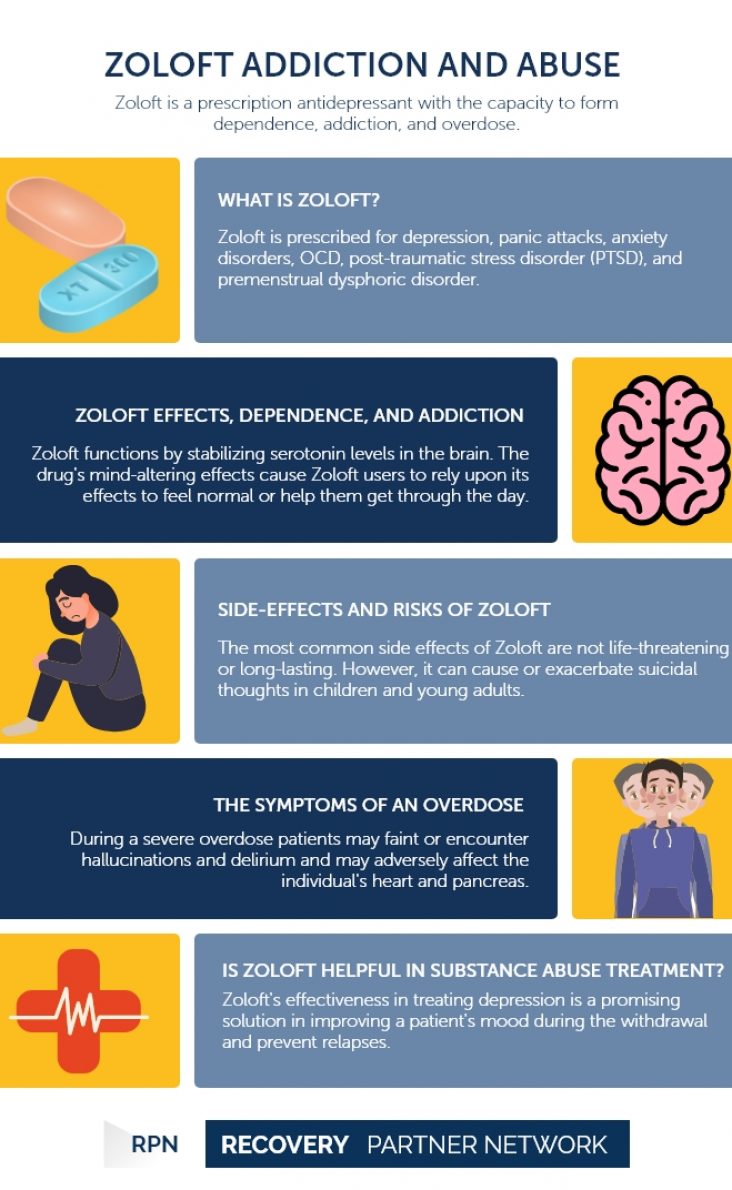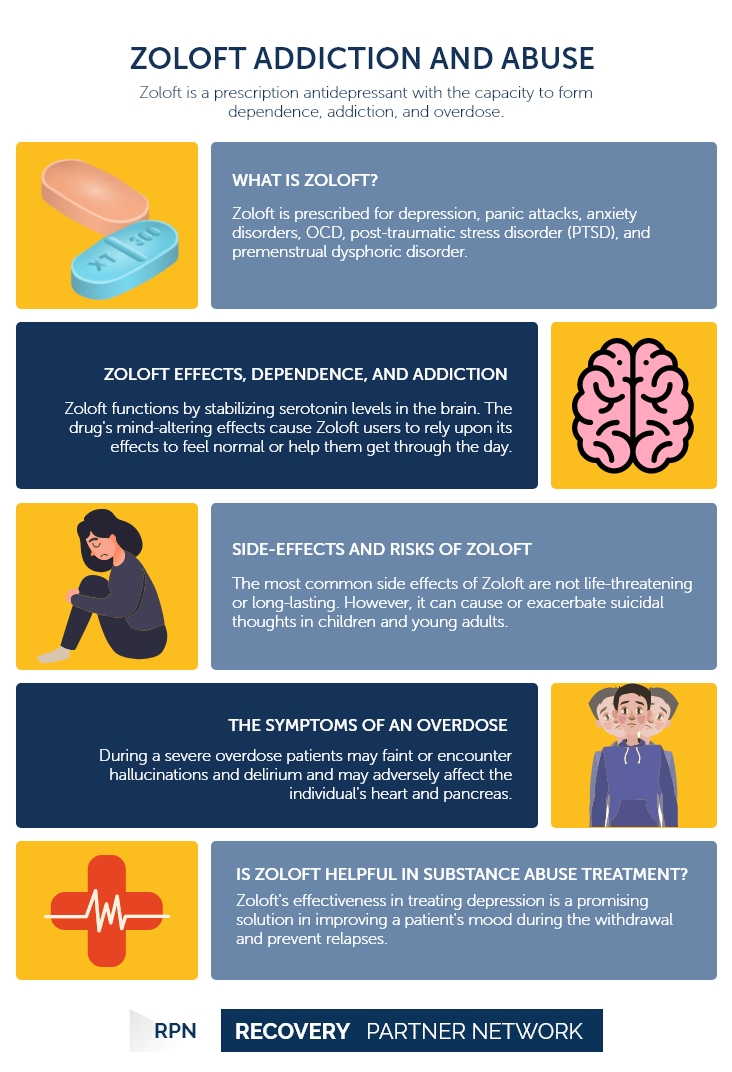Zoloft is a prescription antidepressant with the capacity to form dependence, addiction, and overdose.
Zoloft Addiction and Abuse
Sertraline addiction | Table of Contents
What is Zoloft?
Zoloft is among the most common antidepressant medications in the United States. Zoloft is the brand name for sertraline, a medication that relieves symptoms of depression, panic attacks, anxiety disorders, obsessive-compulsive disorder (OCD), post-traumatic stress disorder (PTSD), and premenstrual dysphoric disorder. Physicians also recommend Zoloft off-label for the treatment of eating disorders and insomnia.
Zoloft is a prescription medication available in the form of pills, tablets, or liquid. In most cases, Zoloft is only prescribed once a day and is considered a safe and effective source of treatment. Nevertheless, Zoloft use often carries the risk of abuse, dependency, withdrawal, and overdose.
FAQ
Zoloft is known to be a safe and well-tolerated anti-depressant by many people with psychiatric conditions.
Zoloft belongs to the class of drugs called selective serotonin reuptake inhibitors (SSRIs). It is more of an anti-depressant than antipsychotic medication.
Zoloft Effects, Dependence, and Addiction
Zoloft functions by stabilizing serotonin levels in the brain, known as a selective serotonin reuptake inhibitor (SSRI). Serotonin acts as a neurotransmitter that manages and balances emotions. Individuals who have lower serotonin levels encounter depression and other mental illnesses. SSRIs function by blocking the brain’s neurons from absorbing serotonin, resulting in more available serotonin to enable connections between neurons, and thus alleviating complications resulting from the absence of the neurotransmitter.
Zoloft is a long term medication that holds the capacity to form a dependence on its users. The mind-altering effects of the drug cause its users to rely upon its effects to feel normal or help them get through the day. However, there remains a controversy as to whether Zoloft is potentially addictive since it is not known to cause cravings, but those who discontinue its use do experience symptoms of withdrawal due to the formation of dependence. Many individuals chose to continue the use of Zoloft to avoid withdrawals, even if they no longer need it.
Symptoms of Zoloft Withdrawal
Zoloft withdrawal is a type of SSRI discontinuation syndrome that impacts around 20 percent of patients who use SSRIs. Since Zoloft contains a short half-life, the effects of Zoloft quickly fade away. Therefore, if an individual abruptly stops taking Zoloft, their serotonin levels can fall drastically. Due to this occurrence, patients will be gradually weaned off their medication during tapering down detoxification.
Although the brain may adjust to post-Zoloft serotonin levels, the body may respond negatively to lower serotonin levels in the nervous system until it reaches appropriate levels. Symptoms of SSRI discontinuation syndrome usually last one to three weeks. The extent of withdrawal symptoms may differ depending on how long an individual has been taking Zoloft.
Zoloft withdrawal symptoms may include:
- Headaches
- Irritability
- Chills
- Dizziness
- Fatigue
- Lightheadedness
- Nausea and vomiting
- Insomnia
- Lack of concentration
- Tingling sensations in the skin
- Vertigo
- Recurring nightmares and vivid dreams
- Suicidal thoughts
- Rebound depression and anxiety
FAQ
Patients may experience an improvement in the symptoms of depression or anxiety within the first week itself.
Zoloft is a medication used in treating social anxiety disorder and panic attacks. Therefore it does help with anxiety.
It has been reported that Zoloft improves mood, sleep quality, appetite, energy levels, and anxiety.
Side-Effects and Risks of Zoloft
The most common side effects of Zoloft are not life-threatening or long-lasting. Cases of significant complications from Zoloft is rare.
The most common side effects of Zoloft include:
- Headache
- Indigestion
- Loss of appetite and libido
- Dizziness
- Drowsiness and fatigue
- Stomach pain
- Sweating
- Tremors
- Nausea and vomiting
- Nervousness and restlessness
The Food and Drug Administration (FDA) has issued a “black box warning” to Zoloft, a reminder of the prescription drug’s potentially dangerous effects. As per the FDA, Zoloft can cause or exacerbate suicidal thoughts in children and young adults. Therefore, Zoloft has not been approved by the FDA to treat children with depression. Although rare, some patients may form an allergic reaction to Zoloft. Symptoms of an allergic response to Zoloft include trouble breathing, hives, and swelling.
Patients are also advised against consuming Zoloft along with alcohol or illicit drugs as it may cause severe complications. The consumption of Zoloft during pregnancy may increase the risk of giving birth to children with neonatal withdrawal and hypertension.
FAQ
Zoloft has a few side effects, which include weight loss or gain, nausea, insomnia, sweating, headache, diarrhea, restlessness, suicidal thoughts, sexual dysfunction, and aggression in children.
Most SSRI antidepressants like Zoloft can make a change in an individual’s personality.
The Symptoms of an Overdose
Drug overdose is possible with Zoloft. An overdose occurs when an individual consumes high doses of the medication or consumes it along with other drugs that generate similar effects. Although many symptoms of Zoloft overdose are uncomfortable, it is usually not life-threatening.
Milder and more common symptoms of overdose include:
- Dizziness
- Agitation
- Nausea and vomiting
- Fever
- Increased heart rate
- Tiredness
- Shaking and tremors
During a severe overdose of Zoloft, patients may faint or encounter hallucinations and delirium. A severe overdose could also adversely affect the heart and pancreas of the individual.
Zoloft overdose may also contribute to the development of serotonin syndrome. Serotonin syndrome is the body’s response to extra serotonin. Although the syndrome is rare, it typically starts within the first day of taking too many SSRIs.
Serotonin syndrome can cause:
- Increased body temperatures
- Fever
- Chills
- Muscle tightness
- Uncertainty
- Potentially deadly seizures
Is Zoloft Helpful in Substance Abuse Treatment?
When symptoms of depression occur during abstinence, it may become challenging for a patient to complete their addiction treatment. The effectiveness of Zoloft in the treatment of depression is a promising solution in improving a patient’s mood during the withdrawal process. Zoloft may possess the ability to help alleviate depression and decrease the chances of a relapse.
A meta-analysis of depression treatment as part of drug treatment programs included four studies on Zoloft’s efficacy. This study found that although SSRIs may be effective in treating depressive symptoms, further studies with larger sample scales are needed to make broad recommendations if Zoloft is to be included in addiction therapy.
Zoloft and Cocaine Addiction Treatment
Although data about the use of antidepressants during withdrawal is somewhat limited, several trials have shown that antidepressants, such as Zoloft, may produce positive results (such as decreased cravings and delayed relapse) in the rehabilitation of depressed cocaine abusers. However, researchers also report that more studies are necessary to assess the dose of Zoloft required for a therapeutic effect, as lower doses (100 mg/day or less) did not produce the same positive results.
Zoloft and Alcohol Addiction Treatment
A 2010 study looked at the effectiveness of integrating Zoloft with naltrexone (an opioid antagonist) to manage depression in patients with alcohol abuse and addiction. The study found that the combination of these two medications may help patients with:
- Relapse prevention
- Improve symptoms of depression
- Decrease adverse reactions such as anxiety, vomiting, and sexual disorders
Such results appear positive for addiction recovery and patients with co-occurring mental health conditions.
FAQ
It is not recommended to take alcohol while taking Zoloft.
Medical professionals recommend Zoloft to be taken for 12 months. Zoloft is also safe to be taken for a longer time under medical supervision.
Recovery Partner Network
We aim to educate and empower. If you feel our library of resources does not cover your specific need, reach out to us, and we would be happy to help.
STATISTICS
© Copyright 2025


